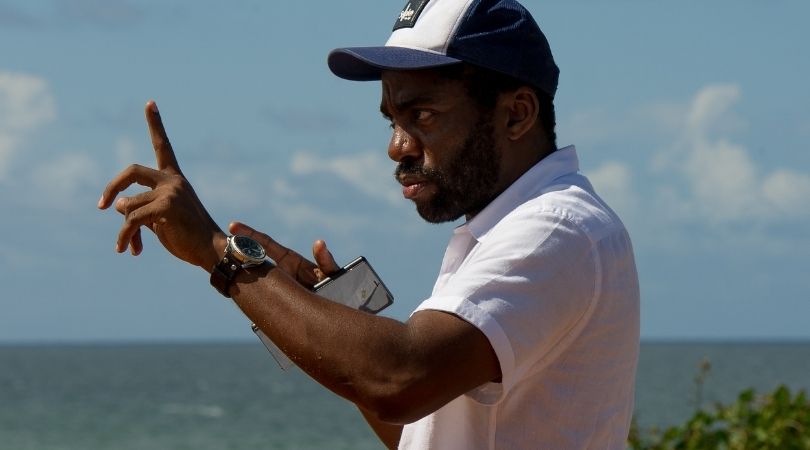
Lázaro Ramos’ Executive Order is among the films premiering at the 2021 SXSW Film Festival. It was originally set for a world premiere at the 2020 SXSW Film Festival. However, the unprecedented political events of the last year have made this film even more timely. Directed by Lázaro Ramos and written by Lusa Silvestre, Aldri Anunciação, Elísio Lopes Jr., and Ramos, the film stars Alfred Enoch (How to Get Away With Murder, Harry Potter Film Series), Taís Araújo, and musical artist Seu Jorge.
Born on November 1, 1978, in Salvador, Lázaro Ramos is an actor, presenter, producer, director, and author who, over the last 20 years, has received more than 70 awards and has played almost one hundred characters in cinema, theater, and television, and has published five books. Ramos has also received a letter from President Barack Obama congratulating and recognizing him as an Influential Personality. Ramos has received other honors and awards at the Toulouse Festival in France in 2007 and the Lima Film Festival in 2016 in Peru.
In addition to work in film, Ramos is widely known in Latin America for his commitment to humanitarian causes. He has served as a UNICEF ambassador since 2009. In 2017, he was elected as one of the most influential Afro-descendants in the world under the age of 40 by MIPAD (most influential People of African Descent) and received his award at the UN headquarters in New York.
I had the pleasure of speaking with the writer-director ahead of his film’s debut, where he explains the process that went into the making of this film, what it feels like for this to be his directorial debut, and how he hopes this film will touch audiences.
BUT WHY THO: Executive Order is your directorial debut; how does it feel for this film to be the first you have directed?
Lázaro Ramos: I’m really nervous about this movie but really happy because I started to plan this movie in 2012. I started my career as an actor at 10 years old, now 30 years as an actor working, but I never wanted to direct a movie. You know, I really prefer, and I really wanted to work as an actor. I love my work. I love my job, but I understand that there is a kind of point of view that I can put in this movie and to direct. And now I really want to direct other movies! I learned that I’m falling in love with this profession.
This movie is very important because we tried to put certain characteristics on [what feelings] we wanted the people to feel. We want the people to laugh in the comedic part and run with the characters in the trailer parts and cry in the drama part. Because I think it’s important to talk about [subjects like] racism, identity, prejudice not just with our mind, but with our heart. [That is what] I’m trying to do with this movie. I don’t know if this is possible because this is my first audience and in Brazil, the people have not seen the film yet. And now we have been in two film festivals, I’m learning about my movie now through your eyes.
BUT WHY THO: I really admire the cast you put together for this film. Were there any specific characteristics you were looking for the talent to bring to these roles? Specifically, for Antonio, Andre, and Capitu?
Lázaro Ramos: They are really special actors. Taís is one of the most incredible actresses from Brazil. I really loved her work. The same for Alfred and Jorge. I feel those characters needed that. We fell in love with their desires to live because of the charismatic way to stay in the war. And because they really respect those jobs. This is important for me because sometimes, when we make a movie about racism, it is just about the pain but this movie, I really wanted to talk about happiness also. And these actors had those characteristics. I’m talking about humanity, you know, to show the audience the many layers of the [black] existence.
BUT WHY THO: The dialogue in Executive Order is so striking and powerful. I love how it does not hold back or sugarcoat for a white audience. What went into crafting some of the dialogue for this film?
Lázaro Ramos: We spent three years writing the script. The first script, we talked to social scientists. They script them to touch the people. Then we start to put some real situations about our lives. We are three black screenwriters and one white screenwriter. And then we start to put in situations from our lives into it. But the second version was too personal, you know. So we contract a researcher who made documents for each scene and put in some real situations from Facebook and Instagram about debates and some historical books. This way was the best way to write the dialogues.
We learn with life. We learn through many years and that’s how the dialogue gets this characteristic. It was incredible work from Maya, and this movie is made with many black hands, you know, in our cast and crew, we are 90% of black persons. And these characteristics are ones you will feel, you know, that’s [what is possible when] working with those kind of people and artists.
BUT WHY THO: The film takes place in a not-so-distant future, however it feels like it is something that could happen as soon as tomorrow. Was that the original intention for the film?
Lázaro Ramos: No, no, no, no, no. We wanted to make an alert. This story started in 2011 as a play in a theater, talking about some stuff that we didn’t want to happen. Unfortunately, many of those situations happened in real life. We first showed this movie in 2019, but the death in the movie is similar to George Floyd. This is something sad. I wanted to think that the art has a huge power to make some alerts for us. Now we can do this, wake up the people, watch the movie and prevent the situations in this movie from happening. You know, that’s my desire. The people feel it, are touched by it and change those mindsets, and contribute to changing situations.
BUT WHY THO: What is the feeling you want audiences to walk away with after they see this film?
Lázaro Ramos: It’s a kind of potential thing. Be powerful to change the world. Don’t stay sitting in the chairs. March with us. I don’t know if a movie has this power, because I’m talking the about same thing that Martin Luther King talked, you know, But if I can put a little bit of the mindset and the heart of the people to change the world, I am happy, but we know we are not Martin Luther King, but we want to march with him.
Executive Order tells the story of a dystopian near future in Brazil. An authoritarian government orders all citizens of African descent to move to Africa, creating chaos, protests, and an underground resistance movement that inspires the nation.
Executive Order premieres on March 16 at the SXSW Film Festival.






